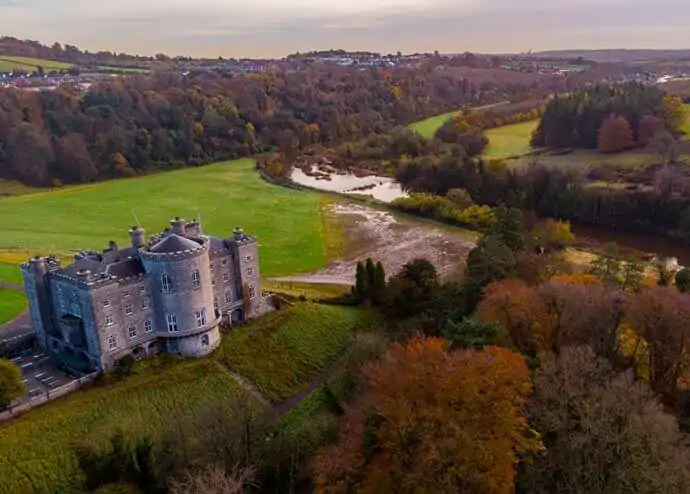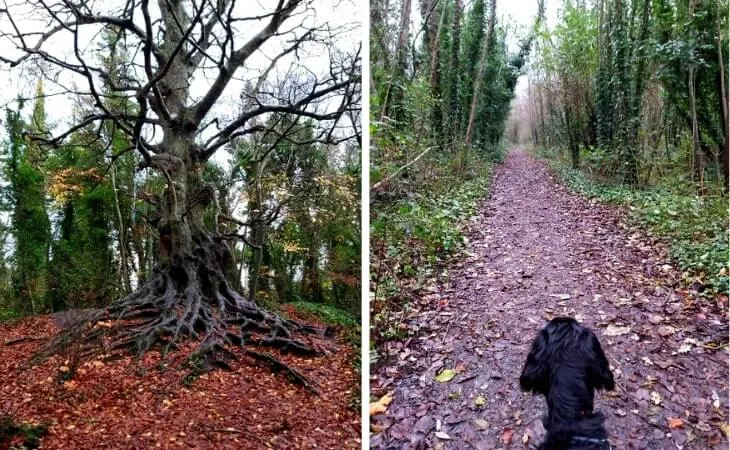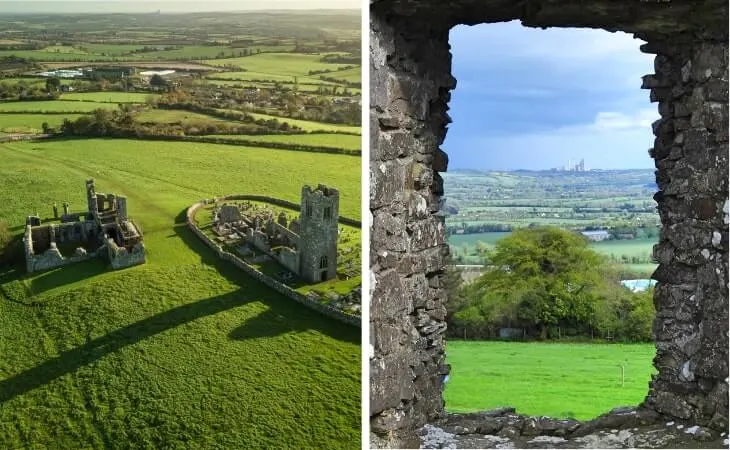The Hill of Slane has its roots in the very foundations of Ireland.
With a shrine to the supernatural Tuatha Dé Danann, a Christian religious centre, and a castle-home to the Barons of Slane for 500-years, it’s bursting with history.
However, a visit here is one of the more overlooked things to do in Meath by visiting tourists, with many opting to visit Bru na Boinne, the Hill of Tara and Loughcrew, instead.
The aim of this guide is to bend your arm a little, and to show you why the Hill of Slane is well worth your attention.
What to know about the Hill Of Slane

Photos via Shutterstock
Although a visit to the Hill of Slane is fairly straightforward, there are a few need-to-knows that’ll make your visit that bit more enjoyable.
1. Location
You’ll find the Hill of Slane a stone’s throw from the centre of Slane village, in County Meath. It’s around a 20-minute walk and it’s only a 2-3-minute drive.
2. Parking
Follow the signs for ‘The yard’ or Abbey View as it turns left off ‘Chapel Street’ (N2). There’s ample parking right in front of the entrance to the Hill of Slane (here on Google Maps), enough for 20 cars, and from there you can take the short walk across the fields to the ruins.
3. Home to historic sites
Just to get you started, according to the Metrical Dindshechas, the hill was named Dumha Slaine after Sláine ma Dela, a king of the Fir Bolg, who is supposed to be buried here. The hill was also home to an early Christian abbey, a pagan shrine, and what’s believed to be two Standing Stones.
4. Steeped in mythology
In the mythologised account of St Patrick’s life, the seventh-century saint defied the High King Laoire and lit a Paschal fire on the hill. The Saint’s interest in this particular hill may have been in response to the hill’s shrine to the Tuatha Dé Danann, a supernatural race in Irish mythology.
The history of the Hill of Slane

Back before the saints, kingdoms and Vikings, the Hill of Slane was a part of legend. It features a shrine to the Tuatha Dé Danann and has been a site of religious activity ever since.
During the bardic verses in the Metrical Dindshenchas, it is reported that the Fir Bolg king, Sláine mac Dela was buried here. The hill’s name was then changed from Druim Fuar to Dumha Sláine in his honour.
Christianity
However, as the Christian faith grew across Ireland, Saint Patrick took up on the Hill of Slane, around 433 AD. From here, he defied the High King Laoire by lighting a fire (at the time, a festival fire was lighting on the Hill of Tara and no other fires were allowed to burn while it was lit).
Whether it was out of respect or fear, the High King allowed the Saint’s work to progress. In time, a friary was founded, and over time it both flourished and struggled.
In 1512, the friary church was restored, and a college was included. The ruins of these structures are present to this day.
Expansion
During the 12th century, a Norman motte and bailey was constructed at the Hill of Slane, as the seat of the Flemings of Slane.
Richard Fleming, the present baron, had the castle built in 1170, although ultimately the Fleming’s castle would be relocated to its current location.
Scenery
Although the Hill of Slane is just 518 feet high, it towers above the surrounding countryside, and offers stunning views from its ‘summit’ on a clear day.
Grab a coffee or something tasty from nearby Georges Patisserie and then head up the hill with a full belly to admire the views.
Things to see nearby
One of the beauties of the Hill of Slane is that it’s a short spin away from many of the best places to visit in Meath.
Below, you’ll find a handful of things to see and do a stone’s throw from the Hill of Slane.
1. Slane Castle (4-minute drive)

Photo by Adam.Bialek (Shutterstock)
The relocated seat of the Barons of Slane, Slane Castle was originally built by the descendants of Richard Fleming, builder of the castle on the Hill of Slane. The present Slane Castle was home to the Flemings from the 12th to 17th centuries before transferring to the Conynghams.
2. Littlewoods Forest Walk (5-minute-drive)

Photos via Shutterstock
A lovely forest walk, and only a short drive away from the Hill of Slane, it meanders through a variety of trees and is peaceful and quiet. Approximately 2km long, it’s an easy walk with no hills and can be completed in around 40-minutes.
3. Brú na Bóinne (12-minute drive)

Photos via Shutterstock
Three well known and large passage tombs, Knowth, Newgrange, and Dowth which were constructed approximately 5000 years ago all sit at Brú na Bóinne. In addition to the tombs, there are a further 90 monuments in the area, making it one of the most significant archaeological complexes in Western Europe.
4. Balrath Woods (15-minute drive)

Photos courtesy of Niall Quinn
Balrath Woods are filled with conifers and broad-leaved trees, some dating back hundreds of years, but most of it is replanting from 1969. The 50-acre wood is available to be explored. Open all year, however, the car park closes at 5pm in winter, and 8pm in summer.

